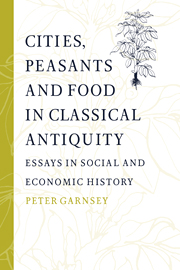Book contents
- Frontmatter
- Contents
- Preface
- Editor's preface
- Acknowledgements
- List of abbreviations
- PART I CITIES
- PART II PEASANTS
- PART III FOOD
- 11 Grain for Athens
- 12 The yield of the land in ancient Greece
- 13 The bean: substance and symbol
- 14 Mass diet and nutrition in the city of Rome
- 15 Child rearing in ancient Italy
- 16 Famine in history
- Bibliography
- Index
13 - The bean: substance and symbol
Published online by Cambridge University Press: 02 December 2009
- Frontmatter
- Contents
- Preface
- Editor's preface
- Acknowledgements
- List of abbreviations
- PART I CITIES
- PART II PEASANTS
- PART III FOOD
- 11 Grain for Athens
- 12 The yield of the land in ancient Greece
- 13 The bean: substance and symbol
- 14 Mass diet and nutrition in the city of Rome
- 15 Child rearing in ancient Italy
- 16 Famine in history
- Bibliography
- Index
Summary
127. KUAMOS HELLENIKOS. Vicia Faba Bean
The Greeke beane is windy, flatulent, hard of digestion, causing troublesomme dreames; yet good for the Cough, & breeding flesh being in ye midst of hott and cold. Being sod with Oxymel, and eaten with the shucks, it stayes dysenteries and the fluxes of the Coeliaci, and being eaten it is good against vomiting. But it is made lesse flatulent, if the first water in which it was sod be cast away: but the green is worse for ye stomach and more windie. But the meale of the beane being applyed as a Cataplasme, either by itself or with Polenta, doth assuage the inflammations that comme of a stroake, & makes skarrs to be of one colour, & helps swelling and enflamed duggs, & doth extinguish milke. But with Hony and the meale of Foenigraec it doth dissolue ye Furunculi and the Parotidae, and ye bluenesse vnder ye eyes; with Roses, & franckincense, and the white of an egge, it doth represse the Procidentias Oculorum, & their Staphylomata, & ye Oedemata. Being kneaded with wine it helps the suffusions & stroakes of the eyes. And being chewed without the Huske it is layd on the forehead as an acollema for fluxes. Being sod in wine it cures ye inflammations of ye stones. And being applyed as a Cataplasme to ye place where the Pubes growes in children, it keeps them impuberes a long tyme; & it cleanseth ye vitiligines, but if the shucks of them be applyed as a Cataplasme, it makes ye haire that is extirpated to grow starveling and thinne.
- Type
- Chapter
- Information
- Cities, Peasants and Food in Classical AntiquityEssays in Social and Economic History, pp. 214 - 225Publisher: Cambridge University PressPrint publication year: 1998
- 32
- Cited by



